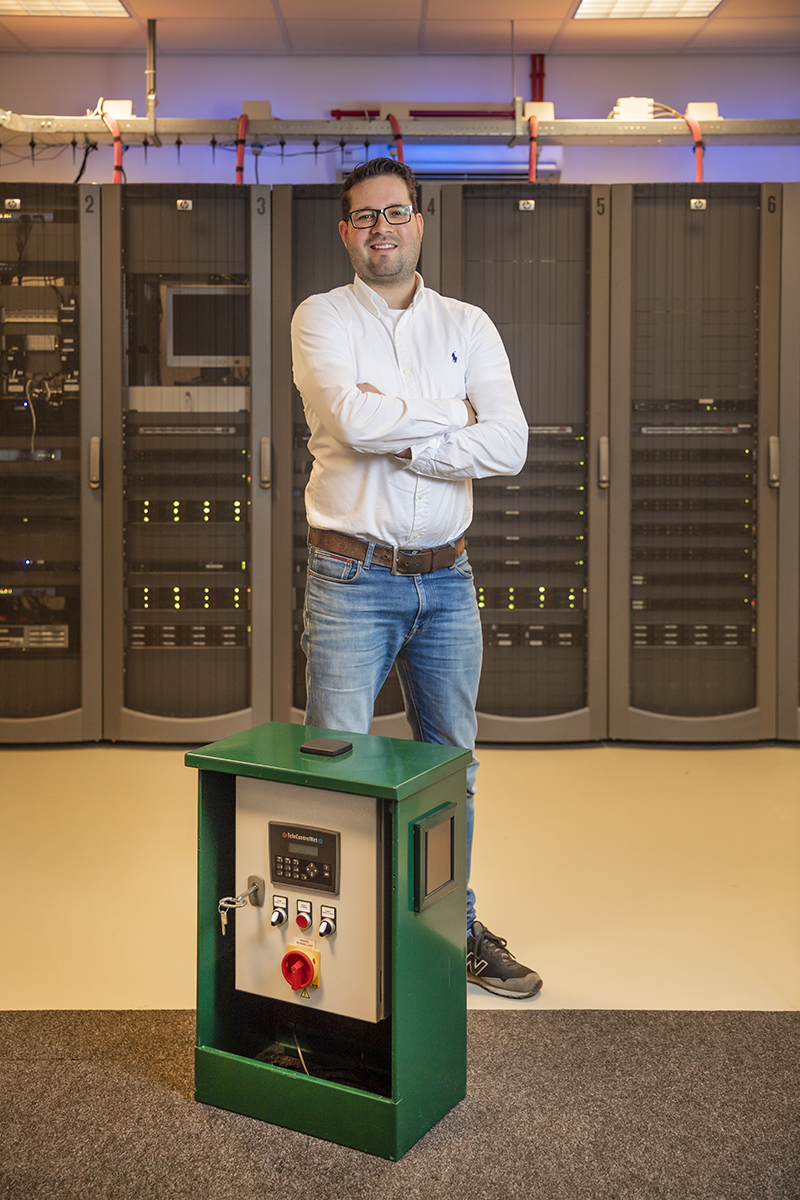
Inter Act
Founder and former Philips employee Jos Nijhof envisaged the direction his business was to take at an early stage. Sensor-driven technology was to become the company’s core business, with remote sensors that would carry out measurements and control processes. The generated data would form the basis for making important decisions. With the help of AI (Artificial Intelligence), this data could predict future effects and improve the streamlining of processes.
Inter Act frequently applies this technique in the Netherlands by monitoring and managing sewage systems and regulating surface water management systems. With climate change, proper regulation of water management systems through additional data collection is extra relevant today.
Jos is proud of his business because they adopted IoT (Internet of Things) technology at an early stage. IoT makes the management of processes, no matter how complex, highly cost-effective, and, together with AI and process improvement, reduces operational costs. With this, Inter Act has been able to create an enormous competitive advantage in IoT technology.
Today, Inter Act also produces in-house IoT components. The global market for the chips required for these products is currently very unpredictable. The business anticipated this development by amply stocking up on critical chip components, making them less dependent on supplier deliveries and allowing them to keep supplying their customers on time.
Since 1989, Inter Act has been active in Europe in industrial automation and system integration. From 2000 onwards, Inter Act has shifted its focus to IoT: web- and cloud-based technologies for industrial applications. This has resulted in the development of their “TeleControlNet” SaaS, a universal IoT suite that offers multiple features, such as:
– Remote control of processes and manufacturing sites
– Remote alerts and notifications for when a process requires attention
– Investigation, comparison and optimisation of processes
– Process flow predictions with AI
– Remote process engineering through cloud-based technology
In November 2020, Inter Act was acquired by the Vienna-based company Wienerberger. From a business with 30 employees, Inter Act has grown to become part of a concern with 17,000 staff and more than 200 manufacturing locations throughout Europe and America. Wienerberger is a supplier of construction materials, including plastic pipes, a component that is frequently found in Inter Act applications. Together, they will develop total intelligent solutions for water, gas and environmental management processes.
Export countries: Germany, and worldwide under Wienerberger

Inter Act
Founder and former Philips employee Jos Nijhof envisaged the direction his business was to take at an early stage. Sensor-driven technology was to become the company’s core business, with remote sensors that would carry out measurements and control processes. The generated data would form the basis for making important decisions. With the help of AI (Artificial Intelligence), this data could predict future effects and improve the streamlining of processes.
Inter Act frequently applies this technique in the Netherlands by monitoring and managing sewage systems and regulating surface water management systems. With climate change, proper regulation of water management systems through additional data collection is extra relevant today.
Jos is proud of his business because they adopted IoT (Internet of Things) technology at an early stage. IoT makes the management of processes, no matter how complex, highly cost-effective, and, together with AI and process improvement, reduces operational costs. With this, Inter Act has been able to create an enormous competitive advantage in IoT technology.
Today, Inter Act also produces in-house IoT components. The global market for the chips required for these products is currently very unpredictable. The business anticipated this development by amply stocking up on critical chip components, making them less dependent on supplier deliveries and allowing them to keep supplying their customers on time.
Since 1989, Inter Act has been active in Europe in industrial automation and system integration. From 2000 onwards, Inter Act has shifted its focus to IoT: web- and cloud-based technologies for industrial applications. This has resulted in the development of their “TeleControlNet” SaaS, a universal IoT suite that offers multiple features, such as:
– Remote control of processes and manufacturing sites
– Remote alerts and notifications for when a process requires attention
– Investigation, comparison and optimisation of processes
– Process flow predictions with AI
– Remote process engineering through cloud-based technology
In November 2020, Inter Act was acquired by the Vienna-based company Wienerberger. From a business with 30 employees, Inter Act has grown to become part of a concern with 17,000 staff and more than 200 manufacturing locations throughout Europe and America. Wienerberger is a supplier of construction materials, including plastic pipes, a component that is frequently found in Inter Act applications. Together, they will develop total intelligent solutions for water, gas and environmental management processes.
Export countries: Germany, and worldwide under Wienerberger
